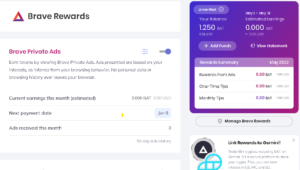
by Aaron R K
I’ll start with the title of this post – isn’t Web 3 supposed to be about decentralization? Then why Web 3 apps, instead of Web 3 dapps? Well, Web3 is still in its early phases, and a lot of the work to be done in developing the new Net is accomplished by using the old one as a point of entry.
Whether you’re on Web 2 or Web 3, it’s good to have some kind of software tool that will allow you to explore online worlds, view videos and NFTs, listen to your favorite tunes, send messages and invest in crypto. Of course I’m referring to this often used, and perhaps sometimes underappreciated, piece of technology called a Browser. Though Brave is a Web 3 browser, it’s made for Web 2 as well, and in my view it’s the best browser available, for Web 2 or 3.
I’ve been using the Brave browser for years now. I’m not sure exactly when I started, but I remember hearing about a crypto-related browser, and jumping in with both feet. I know that I was a member of Brave Community (the forum for Brave users) in December 2018, so we’re talking about 3 and a half years as a satisfied user. That’s over a third of a decade using Brave as as my main browser on a daily basis, for most of my online activities, on both Web 2 and 3. During this time, I’ve found Brave to be far superior to Chrome, Firefox, Edge and other Web 2 dinosaurs.

I also use dedicated phone apps of course, but for many purposes, a good browser, especially Brave, is often better than a dedicated phone app. Brave allows me to control ads, while being protected by some of the software industry’s best privacy safeguards. I’ve installed Brave as the default browser on my smartphones.

Whether using Web 2 or 3, an important issue is privacy. I personally find it objectionable, even creepy, that there are entities which want to covertly track the private interests and communications of strangers. Wasn’t that type of behavior supposed to have gone away, at least in the West, with the fall of communist police states? The good news is that the Brave Browser has been working for years to protect online privacy, and their browser blocks trackers, as well as ads. My Brave browser provides me with a record of the number of trackers and ads Brave has blocked. I’m now past 3 million, a number approaching a million a year, which makes me wonder what staggering loads of private data Chrome and other old school technologies are spewing out.
Further online privacy is available at the click of a button, which enables browsing with the Tor network and software system, enabling anonymous communication.
After 3 and a half years of using Brave daily, for full-time online work, as well as videos, personal email, online banking crypto activities, etc., I have observed that Brave very rarely had performance or connection issues. That being said, some sites may require some kind of ad function or anti-privacy function to be permitted, for these sites to operate properly. In such cases, with the simple click of a button, you can turn off certain ad blocking and privacy functions in Brave. When ad blocking and privacy features are turned on, Brave calls this state “shields up”, and when they are turned off, Brave calls this state “shields down”. However, since Brave works well with all or almost all of the websites I use, I generally do not use this button, and if I do it is rare: probably less than one time per year.
Brave has developed a number of brilliant technologies capable of transforming internet, and on top of that, Brave’s opt-in ad tech promises to transform marketing as well. Brave may resemble Chrome to some degree (it was developed from Chrome code), but it’s a very different product. Brave is rapidly gaining popularity, and in October 2021, Clayton Hartford, Director at Brave Software, reported that the browser had almost 40 million monthly active users.
One of Brave’s innovative features is ad blocking, combined with an opt-in function for those who choose to watch ads in exchange for crypto rewards. For this, Brave uses a crypto token call BAT (for “Basic Attention Token”), on the Ethereum network (where it started), as well as on Solana. User who earn BAT can keep it, trade it for other crypto assets, trade it on a centralized exchange for traditional money, or use it to reward online content providers.
In a Nov 18, 2021 interview with Brendan Eich, on CoinDesk ‘s YouTube channel, the conversation included Brave’s system of rewards for viewing online ads. By using Brave’s ad opt-in, users can acquire Brave crypto rewards for viewing ads, amounting to 70 percent of the gross advertising revenue.
Another feature I like about Brave is its built-in crypto wallet. According to Brave.com: “Brave Wallet is the first secure crypto wallet built directly into the browser. No extensions, no extra steps. That means less vulnerability to faked versions of an app, phishing, and theft.” … “NFT & multi-chain support. Natively connect other web3 DApps, without installing browser extensions.”
The wallet supports Ethereum, EVM compatible assets and Solana assets. “EVM” is part of the general software system of Ethereum, and is also used in a number of other crypto network systems, such as Binance. Avalanche, Binance Smart Chain, and Fantom.
As a built-in browser wallet, Brave offers added security and functions which an extension, such as Metamask, cannot provide. There’s additional protection against your wallet addresses leaking out to uninvited third parties.
You can trade crypto inside the Brave wallet. Metamask users who also use Brave wallet can import from their Metamask wallet.
As if all those features weren’t enough, Brave has a video conferencing function, called Brave Talk.
There’s only one browser that I find even remotely comparable to Brave, and that’s the Opera Crypto Browser. Opera has been integrating Web 3 compatibility into their for a number of years. On my smart phone I have both the Crypto browser and the regular Opera browser. Both have crypto wallets, a built-in VPN for enhanced privacy, and ad blocking.
I personally like the look and design of the Crypto Browsers, both for laptops and mobile devices. They come with a blockchain -related news feed, crypto prices. On my laptop version I found a feature called “Crypto Corner” with crypto-related links. and the Ethereum gas price. The mobile device browser has a news feed with current airdrops!
Want a Dapp? The Opera browser has a section called the Dapp Store, ready to provide one for you.
A very cool feature is Opera’s safe copy and paste, providing increased security, for example when copying and pasting crypto wallet addresses.
On Opera.com, they inform us about a search highlight pop-up tool that allows you to search “the text you highlight on a web page. With just one click, your highlighted text opens a new tab and is queried by your default search engine.” A battery saver function allows you to keep the computer on and use the browser for a longer amount of time, when the laptop is unplugged.
Opera also has a built-in music player, messenger function, and a number of interesting extensions.
My laptop version has a built-in DEFI dashboard called Ape Board. It also has a section dedicated to Web 3 social media, with links to a number of social media dapps. Information is provided about the number of users for each Dapp, and a significant portion of them have few or even zero users! Maybe the information was not updated. Or maybe these are social media services which are new and cutting edge, and which have not been on the Net long enough to build a large user base. They might represent a special opportunity. Getting in on the ground floor of a new social media platform can be beneficial, if the platform becomes popular. Imagine that you were one of the first people to have a Facebook page or a YouTube channel. Early adopters of a new platform or type social media, who want to build an audience for their artistic work, or for business and marketing, often have an advantage in relation to those who come later. If you own or run a business, it might be good to get into Web 3 now, rather than get left behind.
I hope that you have enjoyed this exploration of two very important Web 3 apps. I plan to follow up this article with future explorations of Web 3 Killer Apps, taking deeper dives into these amazing apps and dapps that can transform society.
Disclaimer: This information here, and elsewhere on the website, is provided for entertainment, educational use, and the sharing of opinions and individual observations. This is not provided as advice from a financial advisor. The writer, SurfWeb3.com and/or its partners may own &/or have a financial interest in any or all of the items discussed on this website, &/or on connected social media platforms. There is no endorsement, nor any guarantee of quality, of items referred to on this website, including links, advertisements and affiliate relationships. The user of this site does so entirely and solely at his or her own risk. Please take personal responsibility for your investments, and do your own research.